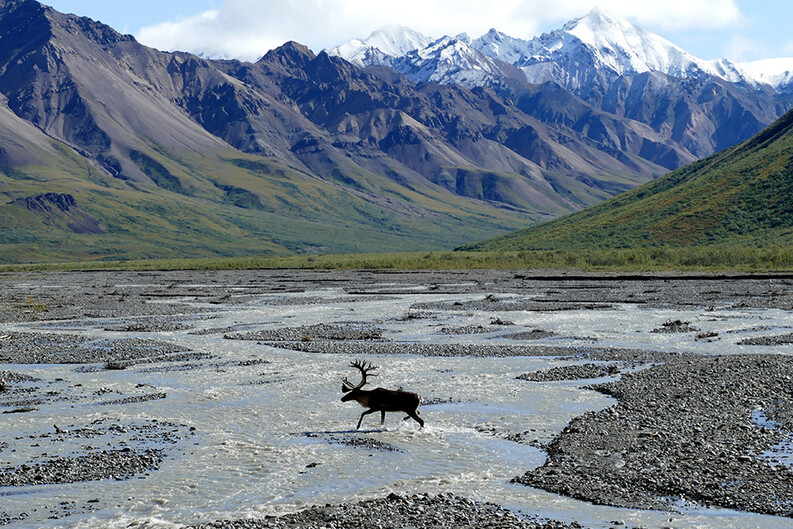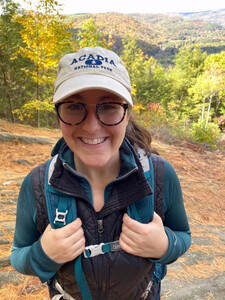Q&A: Kristy Ferraro on How Caribou Impact Ecosystems and the Ethics of Wildlife Management

Kristy Ferraro is a LEAP Student Fellow and Ph.D. candidate at the Yale School of the Environment, where her research focuses on how animals impact soil dynamics, nutrient cycles, and carbon storage. She recently won a Christine Stevens Wildlife Award from the Animal Welfare Institute. The grant will support a research project exploring how isotopic tools may be used both as a noninvasive tool to track animal movement and as a tool to understand how caribou move nutrients through northern ecosystems. Along with Ph.D. candidate Nathalie Sommer M.E.Sc. ’19, Ferraro is also the author of a forthcoming article that explores the ethical issues surrounding behavioral training in wildlife management. LEAP Editorial Associate Jack McCordick, B.A. ’22, spoke with Kristy about her research.
Why are caribou populations in the north declining so rapidly?
That’s a tricky and often political question. We’ve lost 56 percent of our caribou population over the past two decades, which accounts for more than 2.5 million individuals, but we don’t know for sure why it’s happening. One of the hypotheses is that oil and gas development is encroaching on land that caribou need, resulting in both lower food availability and moose populations infiltrating land that was previously just caribou-occupied. With moose come wolves, which then predate the caribou. The other hypothesis is that climate change is causing more icing events. Icing events make food acquisition very difficult for caribou. Normally in the winter they paw through the snow to eat the lichen and the grass underneath, but when ice forms over the snow they can’t do that.
In reality, the decline is probably the result of a complicated mix of factors, with each herd facing its own set of difficulties. That said, caribou herds naturally have crazy fluctuations in population size, which are a part of a cycle of decline and rebound. But the rate of decline we are currently seeing is concerning, and we need to watch the herds carefully to ensure that any anthropogenic impacts contributing to the decline are mitigated.

It’s an unfortunate coincidence that at a time when many large mammals are disappearing so quickly, we’re just beginning to understand the profound role they play in all kinds of ecosystem functions. What have you learned in your research about the roles that caribou play in northern ecosystems, and why is so little still known about these roles?
In the past several decades, ecologists and conservationists have spent tremendous time trying to untangle how animals impact their ecosystems – but you’re right, we have so much more to learn!
When analyzing the way nutrients flow through an ecosystem, ecologists use a framework called ecosystem budgets. This is how we calculate where nutrients are in a given ecosystem — you can think of your high school carbon cycle diagram to get a picture of what I’m talking about. Historically, ecologists largely left animals out of these budgets, partially because they were very difficult to model. We didn't really know where wild animals were and what they were doing. Our understanding of these movements and interactions has grown tremendously as we’ve produced technologies to track them. GPS collaring and camera traps have totally changed the game. So part of the reason our knowledge of the roles animals play is still emerging is that we are still developing the technology and background knowledge needed to address these questions.
Additionally, there was an assumption that given the relative biomass of animals compared to plants, animals didn't play a large role in ecosystem budgets and nutrient cycles. However, recent transformational work has challenged this assumption. My favorite example is this quite amazing study [by Joe Roman and James McCarthy] that came out in 2010 showing that whales play a fundamental role in redistributing nutrients in the ocean. By consuming nutritious food in the deep ocean and coming to the surface to defecate, whales create a “whale pump,” providing nutrient subsides that support life at the ocean’s surface. This paper really opened our eyes and challenged us to think about how else animals might impact nutrient distribution and cycling.
But let’s talk about caribou. There has been significant work exploring the role of their grazing on ecosystems, yet the role these animals play in nutrient distribution and cycling is often limited to grazing. In order to get a more holistic understanding, I want to think about all the ways they impact the various aspects of the ecosystem budget. For instance, caribou often migrate between quite different ecosystems, and one hypothesis we have is that they may impact nutrient distribution by moving nutrients with them — possibly creating a sort of “caribou pump.” I’m just starting my research, and unfortunately COVID-19 has delayed my fieldwork, but once I can get back into the field, I hope to explore many different ways caribou impact these cycles.
Even though your research is still ongoing, do you have a sense for how you would like it to shape the kinds of policy and conservation interventions?
Caribou occupy two very carbon-rich ecosystems: the boreal ecosystem holds 30 to 40 percent of all of our land-based carbon, and the tundra ecosystem, where caribou spend their summers, has tremendous amounts of carbon in permafrost. If caribou impact either of those ecosystems’ nutrient budgets or carbon cycles, it could have implications for carbon storage. Additionally, I hope that if we understand what role caribou play in an ecosystem, we can use this information, along with other types of data and knowledge, to create better-informed conservation decisions and legislation centered on them.
I also think that as we learn more about ecosystems and animals, we begin to appreciate their complexity. And when we view something as complex, we’re more likely to treat it with reverence. So, in addition to the scientific knowledge I will create, I’m hoping that through this work — and I realize that this is a pretty lofty goal — we westerners can go beyond just seeing the instrumental value of caribou, and that we will give them reverence and recognize their intrinsic value. I generally hope we can start to understand animals and ecosystems as things that are not just instruments but recognize that they have their own complexities and systems of interaction.
In a forthcoming article, you lay out an “interest-based rights” framework for evaluating ethical issues that arise in the field of behavioral training in wildlife management. What is this framework, and why did you decide to use it?
This work came out of conversations with my colleague [Yale School of the Environment Ph.D. candidate] Nathalie Sommer M.E.Sc. ’19 (who is also a LEAP fellow!) about the relative dearth of conversations that conservationists and ecologists are having about applying ethical frameworks to their work. Part of the reason for this is that there are only a few people working in the realm of conservation ethics, and even fewer who take a rights-based approach.
In reading about wild animal ethics, we stumbled upon the philosopher Julius Kapembwa. He uses the framework of interest-based rights, which basically extends rights to protect important interests. So, for example, if an individual has an important interest in living, then the right to life is extended to them. I’ve always fundamentally believed animals have rights. Further, I think rights are really powerful when it comes to ethics. For example, even if we only extend to animals the most basic of rights, the right to life, it turns out we are constantly infringing on that right.
Kapembwa specifically discusses three rights that animals have: the right to life, the right to health, and the right to subsistence. Since Nathalie and I are both ecologists with some training in ethics, we wanted to see how we could take this framework, that we both think is interesting and powerful, and apply it to something specific — behavioral training. What tends to be tricky for ecologists when applying any sort of rights-based ethic is that rights come into conflict. An example we use is of an anthropogenically-introduced predator. We argue that by humans introducing the predator, we have infringed upon the right to life held by the native prey individuals, and therefore we have a duty to make amends. One way we might do that is through behavioral training. However, if we then train the prey species to avoid the introduced predator, are we infringing on the right of the predator? We wanted to struggle with these questions using Kampebwa’s framework as guidance and see where it took us.
Throughout the paper, you consistently emphasize that our ethical “obligations are to individuals and not to populations and to species?” Why is that distinction important, and how does it change the kinds of duties we have toward animals?
The individual-population-species hierarchy and dynamic is very difficult in ethics and in conservation. In fact, this is a problem Nathalie and I hope to engage with next. But in general, ecologists tend to think in terms of species and populations, which is often because management decisions are made at these levels. Yet while we often use these higher orders, I think that we’re often making these decisions for the sake of the individuals. So, for this paper, we wanted to just focus on the individual, which is something different for ecologists. This isn’t to say that we don't have ethical obligations to species or populations (they might have rights too!) — but for this specific paper, we were just thinking about the individual. And, as you allude to just focusing on the individual’s rights might indeed change the kinds of duties we have towards animals. For example, if an individual has the right to health, and climate change causes the water within that individual’s habitat to become scarce, we as humans (who caused climate change) may have a duty to make amends for violating the individual’s rights.
How do you see that ethical framework applying to your own work?
In general, I’m just always concerned about animal welfare and the rights of the beings we share the Earth with. That is what inspired me to pursue a career in ecology in the first place. I believe I can best serve the environment and animals by contributing to human understanding, which will hopefully lead to compassion. On a more technical level, when I design an experiment, I ask myself: ‘is it something that benefits the beings that the experiment is examining?’ And if it does, ‘how can I go about conducting this experiment while also respecting the rights of the animals I’m interacting with?’ For example, one of the projects I’m working on right now seeks to develop a noninvasive approach to track how animals move around a landscape. In fact, I think that with a bit of creativity, we could find lots of alternative ways to interact and study animals without being quite so invasive. And Nathalie and I talk about that in our paper. For example, instead of killing a fish to provide chemical cues, why don’t we find a synthetic alternative to do it? I think if we put our minds to it, we can develop many technologies that allow us to both study and respect the individuals that we’re trying to help in the long run.
And finally, how has your involvement with LEAP changed the way you think about these issues?
I could talk all day about how wonderful I find LEAP! As I’m an ecologist, I can often get a bit isolated up in the lab, but LEAP has provided me with this amazing collective of people who deeply care about issues related to animals from all across the university. The conversations I get to have with people who are studying animals and literature, or animals and theory, or ethics and philosophy are invaluable. They have given me so many more dimensions to think through the ways we relate to other beings in the world. It is truly a unique and fulfilling group to be a part of.


